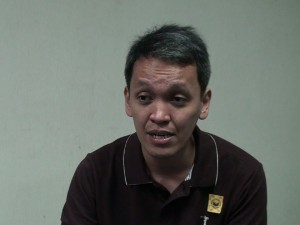MANILA, Philippines—A militant group is staging a protest outside the Supreme Court (SC) Tuesday, insisting that the administration of President Benigno Aquino III “violated the constitution” when he entered the Enhanced Defense Cooperation Agreement (Edca) even as the battle over the legality of the defense pact between the United States and the Philippines begins.
“We will set out to prove that the Edca is a new basing agreement whose provisions violate the Philippine constitution. We will argue that the Edca’s provisions go beyond existing agreements such as the Mutual Defense Treaty and the Visiting Forces Agreement (VFA). We will also point out that President Benigno Aquino III, in entering into the Edca, violated the constitution,” said Renato M. Reyes, secretary general of Bagong Alyansang Makabayan (Bayan) which is one of the petitioners.
Bayan said that many provisions of the Edca are similar to the original and amended 1947 Military Bases Agreement (MBA). The bases treaty expired and was not renewed in 1991, thus kicking out US bases in the Philippines.
“Both the Edca and MBA provide the US with the rent-free, and unhampered use of facilities in the Philippines. The MBA originally defined US bases in various parts of the country, while the Edca seeks to establish ‘agreed locations’ throughout the country. The Edca basically resurrects the 1947 MBA and paves the way for the return of US bases under the guise of ‘agreed locations’.” Reyes said.
Aside from Bayan, other petitioners include former senators Rene Saguisag and Wigberto Tañada as well as militant lawmakers, Bayan Muna party-list Representatives Neri Colmenares and Carlos Zarate.
Named as respondents were Executive Secretary Paquito Ochoa, Defense Secretary Voltaire Gazmin, Foreign Affairs Secretary Albert del Rosario, Budget and Management Secretary Florencio Abad, former AFP Chief General Emmanuel Bautista, Defense Undersecretary Pio Lorenzo Batino, Ambassador Eduardo Malaya, Ambassador Lourdes Yparraguirre, Justice Undersecretary Francisco Baraan III and Defense Assistant Secretary for Strategic Assessments, Raymund Jose Quilop.
The high court has already issued guidelines that would cover the oral arguments which include whether the petitioners have legal standing in the present case; whether the cases/issues raised are justiciable; and whether the Edca is a treaty or an international agreement that needs the concurrence of the Senate.
In particular, the high court said proceedings would also tackle issues on whether the provisions in the Edca covering the presence of US military personnel are already covered and allowed by any existing treaty between the two countries; whether the provisions in the Edca pertaining to the presence of equipment, supplies and material of the US military are already covered and allowed under any existing treaty; and whether any such treaty has already been concurred by the Senate and whether the agreed locations pertained to in Edca are or should be considered as akin to foreign military bases or facilities and if not, what they are and what are their legal justifications for allowing their presence in the country.
Also to be discussed in the proceedings are whether the Constitution allows the presentation, for Senate concurrence, of separate provisions in an agreement instead of the entire instrument; whether the country has already expressed its consent to be bound by the provisions of Edca, and, if it has; whether the SC can still invalidate Edca or any of its provision; and whether the petitioners may validly challenge the provisions of the Mutual Defense Treaty and the VFA in the present case.
The proceedings would also tackle the issue on whether there are limits to the constitutionally- assigned sphere of discretion of the President concerning foreign relations matter and whether the Edca deprives the SC of its judicial power.
The high court gave parties a total of 30 minutes to present their arguments and that in case, more than one lawyer will argue for a party, the lead counsel shall determine how to allocate the 30-minute allocation with co-counsels.
Earlier, Solicitor General Florin Hilbay defended the constitutionality of the Edca which he described as an implementing policy of the VFA.
But the petitioners have argued that Edca is a treaty—not merely an executive agreement as Malacañang has claimed—which needs concurrence of the Senate before it could be implemented.
RELATED STORIES
Battle over legality of Edca starts
Edca: Treaty or executive agreement?


